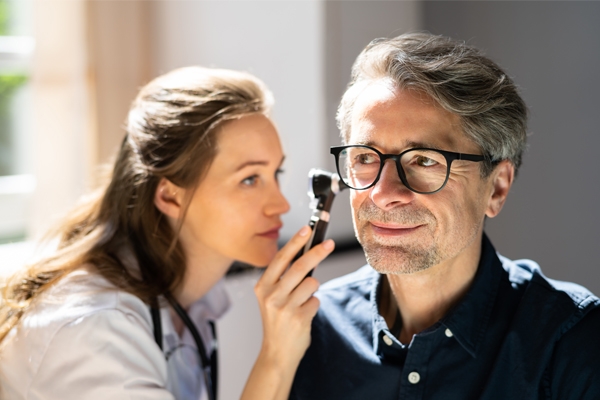Learn About At-Home Earache Remedies from Audiologists


Learn About At-Home Earache Remedies from Audiologists
5 min
Published September 27, 2024
Your Guide to At-Home Earache Remedies
Earaches can turn any day upside down, bringing discomfort nobody wants to deal with. Luckily, relief might be closer and easier than you think. This guide walks you through simple, effective remedies you can try right in your own home. Whether you're facing minor discomfort or trying to ease the pains that come with various ear concerns, the solutions we share can relieve ear pain without stepping out of your front door. Join us as we share insights to turn those moments of discomfort into opportunities for care and recovery.
What Causes Earaches?
Earaches frequently bring people of all ages into doctor's offices, emerging suddenly with symptoms that range from mild to severe. Most earaches, characterized by either a persistent dull ache or sharp pain, usually improve on their own within a couple of weeks. If ear pain persists longer than two weeks, it's important to seek advice from a healthcare professional or an audiologist for further evaluation.
The cause of an earache isn't always linked to an infection. Many times, the discomfort may stem from non-infection-related issues, such as illness or what's known as referred pain. This type of pain is legitimate, though its source lies elsewhere in the body, like from a dental issue. The most common causes of earaches include:
Ear Infection (Acute Otitis Media) – Quite common among children but also affects adults, ear infections can lead to the surgical placement of ear tubes or grommets in chronic cases.
“Glue Ear” – This condition results in a glue-like substance filling the middle ear, usually resolving on its own within a few weeks.
Impacted or Built-Up Earwax – Excessive earwax can lead to discomfort and pain in the ear.
Throat or Sinus Infections or Colds – Infections in the throat or sinuses can lead to earaches due to the interconnected nature of ear, nose, and throat pathways.
Foreign Objects – Items such as a cotton swab stuck in the ear can cause pain and discomfort.
Jaw Pain – Issues such as an impacted or infected tooth or teeth grinding can result in pain that extends into the ears.
Cold Weather – Some individuals may experience ear pain as a reaction to cold temperatures.
Changes in Altitude – Activities like flying, scuba diving, or driving through mountainous regions can cause earache due to pressure changes.
Water Trapped in the Ear or Swimmer’s Ear (Otitis Externa) – Water remaining in the ear canal after swimming or bathing can lead to infection and pain.
Home Remedies That Ease the Pain
Many earache sufferers find relief in trusted home remedies. These solutions effectively alleviate discomfort and are often recommended by hearing doctors. They offer a first line of defense, using simple methods that have stood the test of time to diminish ear pain.
Warm or Cold Compresses
Applying warm or cold compresses can provide immediate relief for earache sufferers. It's often recommended to alternate between the two every 10 to 15 minutes for optimal effect. However, caution is key. Never fall asleep with a heating pad, and always supervise children during its use. When opting for cold or ice packs, remember to wrap them in cloth to avoid direct contact with the skin. Positioning the compresses under the ear has been shown to yield the best results.
Vinegar and Alcohol
For those dealing with outer ear infections or drainage, a mixture of equal parts apple cider vinegar and isopropyl rubbing alcohol can work wonders. After applying several drops to the ear and waiting a few minutes, drain the mixture out. Apple cider vinegar, especially the unfiltered kind, possesses healing and antibacterial properties that can restore the ear canal's pH balance. While it may not directly relieve ear pain, its antimicrobial traits make it an excellent companion to conventional treatments.
Hydrogen Peroxide
Hydrogen peroxide has long been a staple in commercial ear drops for a good reason. When diluted with water, it gently breaks down ear wax without causing harm. Just a few drops, a short wait, and a rinse with clean water can make a significant difference in comfort and hearing clarity.
Gum or Candy
Believe it or not, the simple act of chewing gum or sucking on candy can relieve ear pressure, a common culprit behind ear pain. This method is particularly useful during altitude changes, like flying or mountain driving, as it aids in balancing the pressure in the Eustachian tubes.
Olive Oil
A few drops of warm olive oil, no hotter than body temperature, can soften ear wax effectively. This natural remedy is easy to apply and avoids the risk of burning the sensitive inner ear.
Changing Your Sleep Position
Adjusting how you sleep can have a noticeable impact on earache discomfort. Propping up your head and torso rather than lying flat can provide a much-needed respite and help you achieve a better night's sleep while an earache resolves.
Naturopathic Ear Drops
Available at health food stores and now most major supermarkets, naturopathic herbal ear drops offer a natural alternative to managing ear pain. Often based on clove or lavender and sometimes containing ginger, these drops utilize the antibacterial properties of natural ingredients to provide relief.
Over-the-Counter Solutions
When natural remedies need a little boost, over-the-counter pain relievers, especially non-steroidal anti-inflammatory drugs (NSAIDs), can help manage the discomfort associated with earaches.
When to Seek Professional Help
While these home remedies are effective for temporary relief, they are not cure-alls. If your symptoms persist or you experience more severe issues, consulting with an audiologist or an ear specialist is crucial. They can offer professional advice and treatment options tailored to your specific needs, including medication or surgical interventions.
Remember, earaches don't have to be a prolonged nuisance. With these remedies and professional guidance when necessary, you can find relief and return to your daily routine with ease and comfort.




